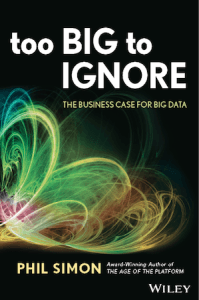 My friend, fellow author, and CMU alumnus Scott Berkun recently interviewed me about Too Big to Ignore. Here’s an excerpt:
My friend, fellow author, and CMU alumnus Scott Berkun recently interviewed me about Too Big to Ignore. Here’s an excerpt:
Q: How is Big Data, which has now become a trendy term, different from the kind of analytics companies have used for decades?
PS: It’s definitely a trendy term. Analytics have been with us for a long time, and they’re still essential. Historically, organizations have used only structured, transactional data to drive analytics. Business Intelligence (BI) and key performance indicators (KPIs) were the rage in the mid-1990s and 2000s. They still matter today. The new boss isn’t totally different than the new boss.
So, what’s different? The types and sources of data behind these metrics. No longer are analytics based solely on structured or transactional data. For example, knowing which customers buy which products remains important. However, there’s a new source driving better metrics: unstructured data brought by Web 2.0, mobility, and the cloud. Now companies can determine what consumers are blogging, tweeting, and writing about on review sites. Amazon, Netflix, and scores of companies use unstructured data to increase sales, innovate faster, and find new insights into consumer behavior.
This unstructured information comprises a great deal of what we are calling Big Data. Analytics still matter, but now organizations have the tools to capture, store, access, and analyze new and critical types of information—and do some pretty amazing things.
To read the whole thing, click here.
 PHIL SIMON
PHIL SIMON


0 Comments